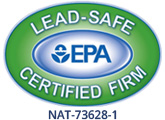How to Improve Indoor Air Quality for Summer
 As the summer season approaches, many homeowners are focused on maintaining a comfortable temperature but indoor air quality (IAQ) is equally important. Poor IAQ can cause discomfort and health issues, especially when windows are closed and the air conditioning is running continuously.
As the summer season approaches, many homeowners are focused on maintaining a comfortable temperature but indoor air quality (IAQ) is equally important. Poor IAQ can cause discomfort and health issues, especially when windows are closed and the air conditioning is running continuously.
Effects include eye, nose or throat irritation, headaches, dizziness and fatigue. Exposure to indoor air pollutants can also aggravate existing health conditions, like asthma. Here are some effective strategies to improve indoor air quality during the summer months.
1. Regular HVAC Maintenance
One of the key factors affecting indoor air quality is your HVAC system. To keep it clean and functioning properly:
- Change Air Filters: Check the air filters every one to three months. Replacing dirty ones prevents dust, pollen and other pollutants from circulating through your home.
- Schedule Inspections: Book a professional HVAC inspection before the summer heat kicks into high gear. A technician will clean the ducts, check for mold and make sure your system is working efficiently.
2. Use Air Purifiers
Air purification can significantly enhance indoor air quality. Place them in high-traffic areas or rooms where you spend the most time to remove contaminants from the air. Look for purifiers with HEPA filters to effectively trap tiny particles like pollen, pet dander and dust mites that worsen IAQ.
3. Proper Ventilation
Proper ventilation is crucial to keep pollutants from building up inside your home. To improve ventilation:
- Use Exhaust Fans: These remove moisture and odors, prevent mold growth and reduce humidity levels.
- Open Windows: On cooler days, open windows to flush out stale indoor air, allow fresh air to circulate and reduce pollutant levels.
4. Control Humidity Levels
Humid conditions can encourage mold growth and increase dust mite populations. Aim to keep the humidity level in your home between 30 and 50 percent. Using a dehumidifier in damp areas can help reduce moisture levels.
Also make sure your air conditioner is appropriately sized for your space. If the unit is too large, it may cool the air too quickly without removing enough moisture.
5. Keep Houseplants
Certain houseplants help improve indoor air quality by absorbing pollutants and releasing oxygen. Spider plants, snake plants and peace lilies are known for their air-purifying qualities but make sure no one in your home is allergic and that the plants you choose are pet-safe.
6. Avoid Chemical Pollutants
Many household products, such as cleaning supplies, paint and air fresheners, can release volatile organic compound (VOCs) into the air. To minimize exposure to these chemicals, choose natural cleaners, low or zero-VOC plants and avoid synthetic fragrances.
7. Regular Cleaning
Keeping your home clean can significantly impact indoor air quality. Dust, vacuum and mop regularly to reduce the buildup of dust and allergens. Pay special attention to carpets, upholstery and curtains, which can harbor dust mites and other allergens.
Improving indoor air quality during the summer is essential for maintaining a healthy and comfortable home. Schedule HVAC service to make sure your cooling system is clean and running efficiently!




